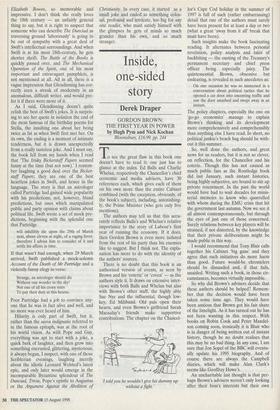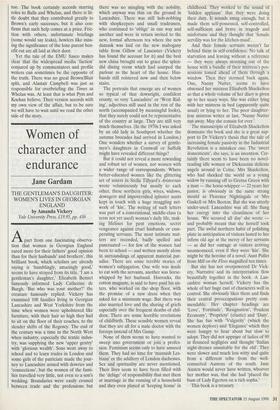Inside, one-sided story
Derek Draper
GORDON BROWN: THE FIRST YEAR IN POWER by Hugh Pym and Nick Kochan Bloomsbury, £16.99, pp. 244 To see the great flaw in this book one doesn't have to read it; one just has to glance at the index. Ed Balls and Charlie Whelan, respectively the Chancellor's chief economic and media advisers, have 30 references each, which gives each of them on his own more than the entire Cabinet combined (with the exception, obviously, of the book's subject), including, astonishing- ly, the Prime Minister (who gets only five mentions).
The authors may tell us that this accu- rately reflects Balls's and Whelan's relative importance to the story of Labour's first year of running the economy. If it does, then Gordon Brown is even more isolated from the rest of his party than his enemies like to suggest. But I think not. The expla- nation has more to do with the identity of the authors' sources.
There is no doubt that this book is an authorised version of events, as seen by Brown and his 'coterie' or 'coven' — as the authors style it. It draws on extensive inter- views with both Balls and Whelan but also with Brown's other staff, the highly able Sue Nye and the influential, though low- key, Ed Miliband. Old pals open their hearts, and even Brown's girlfriend Sarah Macaulay's friends make supportive contributions. The chapter on the Chancel- I told you he wouldn't give his dummy up without a fight.' lor's Cape Cod holiday in the summer of 1997 is full of such (rather embarrassing) detail that one of the authors must surely have been present for at least a day or two (what a great 'away from it all' break that must have been).
Such insights make the book fascinating reading. It alternates between personal revelation, policy analysis and tales of backbiting — the ousting of the Treasury's permanent secretary and chief press officer being especially juicy. The quintessential Brown, obsessive but endearing, is revealed in such anecdotes as:
On one occasion he was so immersed in a conversation about political tactics that he opened a car door into oncoming traffic and saw the door smashed and swept away in an instant.
The policy chapters, especially the one on `go-go economics' manage to explain Brown's thinking and its development more comprehensively and comprehensibly than anything else I have read. In short, no political junkie's beach bag should be with- out it this summer.
So, well done the authors, and great news for us readers, but it is not so clever, on reflection, for the Chancellor and his coterie. Though this has not caused as much public fuss as the Routledge book did last January, such instant histories, being highly subjective, are bound to stir up private resentment. In the past the world would have had to wait decades for minis- terial memoirs to know who quarrelled with whom during the EMU crisis that hit the government last autumn. Now we see it all almost contemporaneously, but through the eyes of just one of those concerned. Surely relations between key players will be strained, if not distorted, by the knowledge that their private deliberations might be made public in this way.
I would recommend that Tony Blair calls together his Cabinet 'big guns' and they agree that such initiatives do more harm than good. Future would-be chroniclers should be dissuaded and, if that fails, unaided. Writing such a book, in those cir- cumstances, becomes virtually impossible.
So why did Brown's advisers decide that these authors should be helped? Remem- ber that the decision would have been taken some time ago. They would have been anxious that Brown got his fair share of the limelight. As it has turned out he has not been wanting in this respect. With books on Robin Cook and Peter Mandel- son coming soon, ironically it is Blair who is in danger of being written out of instant history, though he no doubt realises that this may be no bad thing. In any case, I am sure that Jon Sopel of the BBC will eventu- ally update his 1995 biography. And of course there are always the Campbell diaries, which will make Alan Clark's seems like Geoffrey Howe's.
An uncharitable last thought is that per- haps Brown's advisers weren't only looking after their boss's interests but their own too. The book certainly accords starring roles to Balls and Whelan, and there is lit- tle doubt that they contributed greatly to Brown's early successes, but it also con- firms that such help comes at a price. Fric- tion with others, unfortunate briefings (some would say leaks), howlers like miss- ing the significance of the lone parent ben- efit cut are all laid at their door.
Yet the tale of the EMU fiasco makes clear that the widespread media 'faction' conjured up by commentators and profile writers can sometimes be the opposite of the truth. There was no great Brown/Blair split, and Alastair Campbell was just as responsible for overbriefing the Times as Whelan was. At least that is what Pym and Kochan believe. Their version accords with my own view of the affair, but to be sure we will have to wait until we read the other side of the story.



























































 Previous page
Previous page